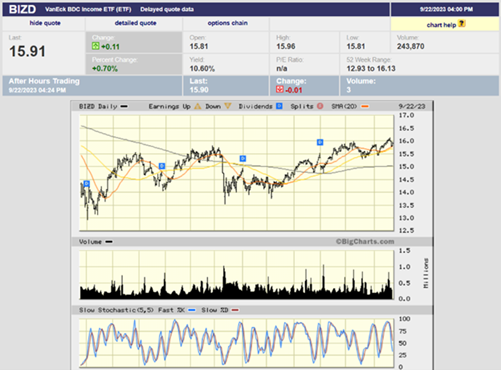As far as the Federal Reserve is concerned, interest rates will be higher for considerably longer than both the stock and bond markets were banking on. The policy statement accompanying the recent rate decision laid out a path where the Fed is not expecting to reduce rates in 2024. In this environment, consider the VanEck BDC Income ETF (BIZD), explains Bryan Perry, editor of Cash Machine.
This new policy directive implies the Fed is in favor of one more rate hike by year-end while lowering the expectation for multiple rate cuts in 2024. The negative reaction by the equity market falls under the notion of further price-to-earnings multiple compression, primarily for growth stocks. That explains the sudden and sharp pullback in the Magnificent Seven artificial intelligence (AI) stocks that ruled the market for the front half of 2023.
The FOMC’s 2024 median rate outlook is now at 5.1%, up from its outlook for 4.6% in June, while its outlook for 2025 rose to 3.9% from 3.4%. This comes as the committee noted inflation remains elevated. This adjustment was material in the eyes of market participants and extended the market’s losing streak to three straight weeks, with this past week led lower by consumer discretion and real estate.
Right, wrong or indifferent, the Fed is convinced inflation in its various forms will persist. It should be noted Fed Chair Jerome Powell acknowledged that the economy has been more resilient than forecast. If the economy comes in stronger than expected, he said, that just means the Fed will have to do more in terms of monetary policy to get back to 2%, “because we will get back to 2%.”
Against this backdrop, income investors seeking inflation-resistant income with inflation-beating yields have to look beyond conventional high-yield debt. Several business development company (BDC) stocks are trading higher as a function of holding portfolios of floating rate loans, tied to LIBOR or SOFR rates, leading to rising revenue every time the Fed increases its overnight lending rate.
As regulated investment companies (RICs), BDCs have to pay out 90% of their net income, just like REITs, but with a few exceptions. They can use leverage and derivatives to enhance yield. As a result, there are a few very well-managed BDCs with bullish charts that pay out 10%+ yields. The BIZD ETF pays 10.6% and is a way to cast a net over some of the top performing BDCs in the sector.

During the month of September, where it seems not much of anything is working in the most coveted sectors, there are a handful of bright spots that aren’t just holding their own in terms price performance, but also delivering the kind of payouts that can meet and beat both inflation and taxes on an income and total return basis.
That’s a hard combination to find in the current market. But as the saying goes, sometimes you’ve got to think outside the box to identify a scenario that can produce positive results.
Recommended Action: Buy BIZD.










